he/him https://probablypen.straw.page
Last active 60 minutes ago
Don't wanna be here? Send us removal request.
Photo

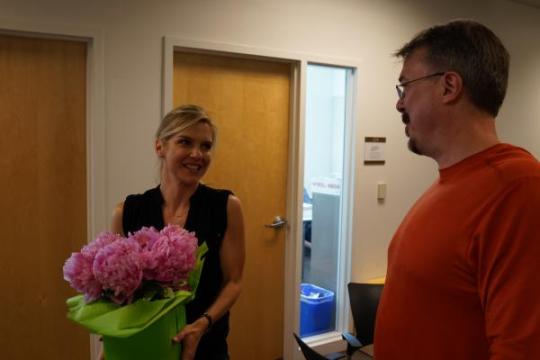

Tom Schnauz on Twitter: “#tbt Exactly 1 year ago was 1st cast reading of Better Call Saul; then Rhea Seehorn stole these flowers from Vince.”
305 notes
·
View notes
Text
Grief, Cronyism, and Jimmy McGill
An essay by Annie Trinty
7/24/25
Better Call Saul is a legal and crime drama series which ran on the AMC network from 2015 - 2022. The story follows con artist Jimmy McGill as he repeatedly tries and fails to forge a respectable career as a defense attorney, and how his experiences shape the cynical and opportunistic approach he would ultimately adopt to practicing the law. One major plot thread through the first three seasons is his difficult relationship with his older brother, Chuck. Chuck McGill was a revered figure in the New Mexico legal scene; he was known for his rigid principles and integrity, and had many friends in high places. Their relationship became strained when Jimmy learned that Chuck had been an obstacle to his career almost every step of the way, and Chuck rationalized doing this by explaining that because of Jimmy’s criminal past, he will never change and can never be a “real” lawyer. This led to both brothers compromising their integrity and attempting to sabotage each other’s careers, and ultimately an altercation where Jimmy broke into Chuck’s house, yelled at him, and destroyed a cassette tape. For this, Chuck had Jimmy arrested and attempted to have him disbarred. Instead, Jimmy merely had his license suspended for one year, but during this time Chuck’s mental illness became more severe and Chuck committed suicide. In the final two episodes of Season 4, titled “Wiedersehen” and “Winner” respectively, Jimmy makes two attempts to be reinstated by the New Mexico Bar Association, all while still grappling with the emotions of losing such a complicated relationship. Across these two episodes, we can see how he is pressured to perform his grief publicly in order to get his career back on track, and how this expectation of “sincerity” only prevents Jimmy from sorting out his real emotions.

In Season 4 Episode 9 "Wiedersehen", our protagonist attended his first reinstatement hearing. He was interviewed by a board of three chairpeople; a young woman who was charmed by Jimmy, a balding man who smiled but eyed him judgementally, and a blond woman whose expression remained neutral. On paper, Jimmy had all the right answers: for the past year, he had been a model employee at CC Mobile, and he was able to cite and give an opinion on recent case law extemporaneously. However once the hearing was complete, he learned he was rejected on the grounds that he was “insincere”. Was this fair? Arguably yes. When asked about his suspension, he responded with generic cliches such as “I am humbled by the sheer stupidity of my actions,” and “nothing like that will ever happen again”. On the other hand, when asked what the law meant to him, Jimmy gave a thoughtful and honest answer. He spoke of how much advocating for his clients meant to him, and we know that much was genuine, because by that point in the show we have seen the dedication with which he handles most of his cases. The character may not be sorry for quarreling with his brother, and he may not philosophically appreciate why cutting corners is wrong, but when he said, “Helping my clients, you know… arguing on their behalf, that’s the best thing that I’ve ever done. And this past year, I’ve missed the hell out of it,” those words came from a place of real contrition that stepping out of line had stopped him from doing what he loved. Jimmy was also sincere when he named his school, the University of American Samoa, as his inspiration; it’s true that struggling alone through a correspondence school program probably informed his self-image as an underdog and anti-elitist.

Arguably this man does not have the disposition to be a lawyer. In life, Chuck criticized Jimmy for his impatience, how quickly he could be provoked to bend the rules to get his way, and this episode shows that entitled side of him. He chases the balding chairman down and confronts him in the stairwell when he learns his application was denied, and after the chairman leaves, Jimmy throws his briefcase against the wall then drives angrily through the parking structure. He can be petulant. Any chapter of the Bar Association needs to be certain that unprofessionalism will not happen a second time, and while Jimmy answered two of the board’s questions truthfully, the fact that he answered the question about remorse with a canned response would be a good reason to reject his application. However when he tearfully recounted these events to his girlfriend, Kim, she had an alternative theory about why he was deemed insincere. Chuck was beloved by many people on the board, and the chairpeople Jimmy spoke with almost certainly read the transcripts of his disbarment hearing. When they asked what Jimmy thought about the events leading up to his suspension, they were fishing for him to talk about Chuck; when they asked what the law meant to him, they were prompting him to talk about Chuck; when they asked whether there was any particular influence on his views, they were goading Jimmy to talk about Chuck. And because each opportunity went over his head, he was declared insincere. Jimmy was understandably appalled: “So I’m supposed to make a big hairy deal about my dead brother at my reinstatement hearing? How is that sincere?”. He went on a rant stating that he doesn’t think about Chuck, showing that he was still in the early denial stages of grief. He had a point, though. The rivalry with his brother was relevant to the question of Jimmy’s professional integrity, but if the board had expected Jimmy to give a eulogy, that would have been completely inappropriate to the issue at hand.

Jimmy still wanted to be a lawyer, though, so degrading as it may be, he decided to go ahead with what he did best: putting on a show. In Season 4 Episode 10 “Winner”, he and Kim set into motion a plan to emotionally manipulate Chuck’s colleagues. Jimmy had attended Chuck’s funeral, but now, almost a year later, he would spend hours idling by the gravestone in the hopes others would see. Jimmy had nothing to say to the headstone, so he mumbled nonsense until visitors approached. He would go thousands of dollars out-of-pocket to donate a reading room to Chuck’s office building and host a gala for its unveiling. Jimmy agreed to sit on the board of a scholarship committee established in Chuck’s honor, even though as Kim pointed out earlier in Season 4, doing so could only ever serve to further upset him because Chuck never would have extended such a gesture of good will to Jimmy in life. Sure enough, when the scholarship was awarded to an overachiever rather than a former shoplifter in need of a second chance, Jimmy took it personally. Practically since Season 1, Jimmy had been struggling with the belief that no matter how long he straightened up and flew right, the world would still treat him as a criminal. This was especially true of his relationship with Chuck, and when this young woman Jimmy identified with, Kristy Esposito, was rejected for the scholarship, Jimmy took it as confirmation of all his worst fears. In the parking lot, Jimmy tracked Kristy down to deliver a lecture: the committee had made up their mind about Kristy before she walked in the room, when they look at her all they see is her mistakes, and it shouldn’t matter because she can be successful in spite of that prejudice. Jimmy told Kristy that she “never mattered much to them”, almost the exact wording of what Chuck said to Jimmy right before his suicide.

In the next scene, Jimmy’s car wouldn’t start (a recurring motif symbolizing how he couldn’t catch a break) and so he broke down crying alone in the dark of the parking garage. No one was around to witness this; this was not part of the performance; even in the director’s commentary version, the showrunners state that Jimmy’s emotions were genuine in that scene. With the context of his outburst at Kristy Esposito, we can begin to understand why he is crying: he’s angry. Anger is a typical healthy stage of grief; usually the grieving person is angry that a loved one was taken away from them, but it’s not unheard of for the grieving person to be angry about unfinished business. The last words Chuck ever said to him was to deny he ever cared about him, and now Jimmy has to simply live without the closure of them ever reconciling. In life, Chuck manipulated Jimmy into sharing a case, then went back on his promise to let Jimmy work at the firm. Chuck extorted Jimmy into quitting his job at a second firm. He poached a client away from Kim Wexler, seemingly just to discourage her from working with Jimmy. Both brothers were in the wrong, and there were many unscrupulous actions Chuck took during their falling-out, yet seemingly that side of the story didn’t matter to the gatekeepers of Jimmy’s future. If Jimmy wanted to be a lawyer, he wasn’t allowed to be angry at Chuck; he had to yield to a narrative where he was the inferior sibling and he had nothing of merit to offer with his own approach to the law. Jimmy was expected to grieve the pillar of the community the public knew Chuck to be, and this left no room to say goodbye to the difficult person he was in private. That is why Jimmy seemed to have pulled himself together by the time it occurred to him to read Chuck’s letter at the Appeal Hearing: a psychological rift had formed between the spite he was actually feeling at this stage in the grieving process, and the project of giving the relevant authority figures the rose-colored version of Chuck they wanted to hear.

Years before Charles McGill set himself on fire, he wrote a letter to his little brother and included it in his will, to be delivered upon his death. The letter was masterfully eloquent. It was phrased as an olive branch; to the uninformed observer, the tone of fraternal warmth was evident. However, when Jimmy first read the letter, he had no reaction to it, not just because he was in denial of his feelings, but because the letter was a lie. Whatever charitable spirit Chuck was in when he wrote it, the final word on their relationship was that he could never suffer simply agreeing-to-disagree. Even in the wording of the letter, contempt peeks through in phrases such as, “I hope that when you read this, you remember me not only as your brother, but as a person who was always in your corner”. Most importantly, the letter itself acts as a gesture that Chuck will always get the last word, even from beyond the grave. Jimmy knew that it would be ghoulish to use the letter to make his relationship with Chuck appear better than it was, but given how the letter must have felt weaponized against him, it’s understandable why he did it.

At last, the story arrived at Jimmy’s second hearing to appeal for his reinstatement, where the farce reached its climax. There were some sincere moments in his final oration. When he began reading Chuck’s letter and then stopped himself, the episode’s audience understood that he was genuinely uncomfortable airing such private matters publicly. However, most of Jimmy’s appeal statement was the substance of a much more formulaic courtroom drama. He reminisced about what a great lawyer Chuck was, he smiled humbly as he recalled how badly he wanted to make him proud, and he utterly deprecated himself by saying, “I’ll never be as moral as him, I’ll never be as smart, I’ll never be as respected, I’ll never be as good as Chuck”. At the close of his speech, Jimmy’s eyes twinkled as he laid it on thick: “I never had the chance to write him a letter, and to tell him all the things that I should’ve,” a statement the episode’s audience can understand to be completely insincere, since Jimmy had no kind words for Chuck earlier when he visited his grave.

In a just world, Jimmy’s hearings would have been reviewed by people who could be objective and had no personal fondness for the man who targeted him for suspension. In a just world, the answers Jimmy gave in his initial interview would have been evaluated on their own merits and not for how well they paid homage to a fallen colleague. In a just world, the donation of the reading room would have been recognized as the crass attempt to throw money at the problem which it was. In a just world, the appeal hearing would have focused on whether there was an error in the initial hearing, or failing that it should have at least focused on Jimmy’s professional character: his pattern of insubordination, his clear anger-management problems. In a just world, a cheesy, tear-jerking speech about how much he loved his brother would not have been the key to Jimmy’s reinstatement, but it was. As the board members dried their eyes, Jimmy gloated to his girlfriend, not just that he had successfully gamed the system, but that in general, his cynical worldview that anything and everything could be gamed was vindicated. Kim was right; it was all about Chuck, the whole time. On some level, he understood that this victory was deeply pyrrhic. Better Call Saul shows time and time again that Jimmy is disappointed in the gullibility of other people, and that he practices con-artistry out of some displaced need to punish them. What other lesson could he take from this experience? A decision about his career was just made for him, which had nothing to do with his competence, and everything to do with baring his private emotions to the scrutiny of people who had no idea what it was like taking care of a mentally ill relative. He felt picked over by vultures. Jimmy was constantly under scrutiny for his perceived lack of professionalism, but the audience can see that he was just desperately following the social cues he was given; the antagonists he was up against may dress nicer than him, they may come from better schools, they may have had more respect for procedure, but they were so distracted by their ideal of a figurehead that they ignored his growing instability and abuses of power.

Season 4 of Better Call Saul has a lot to say about how grief is not a linear process, and how the pressure to perform for the public can emotionally stunt a person going through it. However, the most interesting message in “Winner”, whether the writers intended it or not, is that the New Mexico Bar Association is corrupt. At the very least, this is true within the logic of the fiction. When the two reinstatement hearing scenes are watched back-to-back, Jimmy’s honest answer about his love for his clients is dismissed as “insincere”, and his manipulative song and dance is rewarded. The episode frames the steps Jimmy takes as childish and absurd, and yet against all odds it pays off. The various chairpeople are so dazzled by simple philanthropic gestures - reading rooms, large headstones - that they failed to honor Chuck’s actual dying wish: that his brother be kept away from the levers of power! Jimmy McGill is an unscrupulous character; even on his best days, he was easily provoked into bending the rules at the first sign he wouldn’t get what he wanted. The board was right to reject him the first time, because he was really only sorry he had gotten caught. But when he was approved on his second attempt, he was approved for all the wrong reasons, and in that way the legal institution helped to create Saul Goodman.

Corruption in the legal field is a hot button issue these days. For example, Supreme Court Justice Clarence Thomas has come under fire in the past few years for his acceptance of lavish gifts from donors such as Harlan Crow. This revelation has shaken many Americans’ fundamental trust in the wisdom and objectivity of the judiciary branch, and in the system of checks and balances as a whole. On a more local level, the California State Bar has faced criticism for its acceptance of gifts from Thomas Girardi and Mike Feuer, neither of whom had their licenses revoked in a timely fashion, despite obvious misconduct. It seems everywhere we look, wealthy defendants are able to pay their way around facing consequences for their actions, meanwhile the indigent defense system is cracking under its own weight. In almost every state in the country, public defender offices are overburdened, understaffed, and underfunded. In Montana, the office of Rhonda Lindquist was held in contempt and fined for turning away too many clients, despite her repeated warnings to the state that her office was not being given the resources to meet the demand. The result is innocent people being held in detention for extended periods of time without due process.

One explanation for the growing rift between the treatment of poor and wealthy defendants is the myopia of the legal system’s most influential decision-makers. The majority of high-paying positions in government and corporate firms only consider candidates from an alarmingly small pool of prestigious schools including Yale and Harvard, and tuition for these schools has skyrocketed in the past decade. On top of this, educators from these schools are almost exclusively alumni of the same elite schools and have had little field experience as practicing lawyers before becoming tenured, meaning that graduates from Yale and Harvard are not getting a diverse education. All across America, there are thousands of lawyers who matriculated through community colleges, night schools, and correspondence schools, who have imperfect histories, who are taking on twenty or more PD cases a month and still struggle with student debt. Their voices would contribute a lot to the Department of Justice and the federal circuit courts, and yet there is still an unspoken stigma that their expertise is inferior. Better Call Saul concerns itself greatly with the way money and classism pervert the justice system; arguably, it is the show’s central conflict. It does not have a solution for problems like biased character evaluation procedures. It can only encourage the individual to show some resilience against the obvious pressures being applied to them.

Works Cited
“Wiedersehen.” Better Call Saul: Season 4, written by Gennifer Hutchison, directed by Vince Gilligan, AMC, 2018.
“Winner.” Better Call Saul: Season 4, written by Peter Gould and Thomas Schnauz, directed by Adam Bernstein, AMC, 2018.
Lubet, Steven. “The Ballad of Clarence Thomas and Incorruptibility.” The Hill, 2 Jan. 2024, https://thehill.com/opinion/judiciary/4384991-the-ballad-of-clarence-thomas-and-incorruptibility. Accessed 24 July 2025.
Flanagan, Jerry and Ryan Mellino. “State Bar Action is Overdue in City Attorney Corruption Scandal.” Daily Journal, 10 Jun. 2024, https://www.dailyjournal.com/article/379087-state-bar-action-is-overdue-in-city-attorney-corruption-scandal. Accessed 24 July 2025.
Anderson, Emma. “If You Care About Freedom You Should Be Asking Why We Don’t Fund Our Public Defender Systems.” American Civil Liberties Union, 8 Mar. 2022, https://www.aclu.org/news/criminal-law-reform/if-you-care-about-freedom-you-should-be-asking-why-we-dont-fund-our-public-defender-systems. Accessed 24 July 2025.
Campos, Paul. “Legal Academia and the Blindness of the Elites.” Harvard Federalist Society, vol. 37, no. 1, Dec. 2013, pp. 179-186.
24 notes
·
View notes
Note
Absolutely obsessed with your artstyle!! 😭❤️
Can I suggest Nacho and Jesse crossover? Just them doing some stupid shit and having a bromance (it's canon, Vince told me)
HAVE A GOOD DAYYYYY🫶🏼

just let Jesse go go karts!!!!!!!! they are at a fair I think it would be funny, Jesse wants plushies, Nacho wins them for him and Mike pays for the games
sorry I just wanted to draw mike
270 notes
·
View notes
Text
Mike and Gus
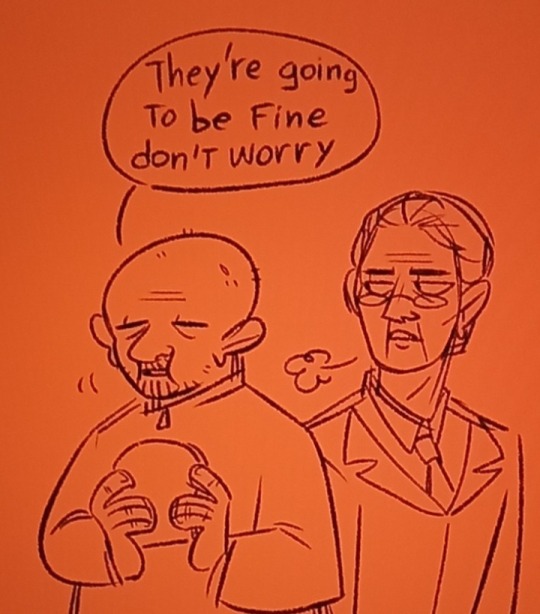

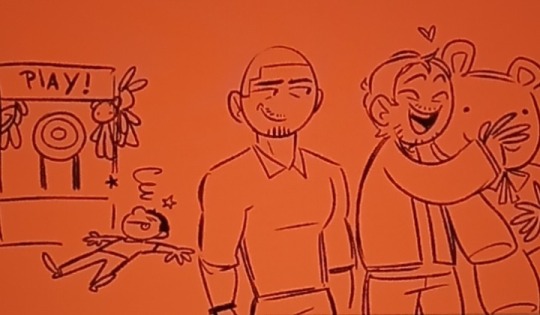
Jesse and Nacho at the fair make me happy just leave me alone
The guy at the stall tried to scam them and Nacho hit him so his lil bro Jesse can have his teddy bear
Mike and Gus are their parents
205 notes
·
View notes
Text
lord take all of their suffering and give it to Walter White


3K notes
·
View notes
Text
never not thinking about the fact that jane margolis would've survived if she'd been the little spoon 😔 but no, being a dominant alpha woman to her beloved boyfailure came first I guess 😔😔😔

49 notes
·
View notes
Text
...sometimes a character whos a criminal doesnt have to end up in prison and thats great 🫶



99 notes
·
View notes
Text
nacho varga doodles + chibi lacho
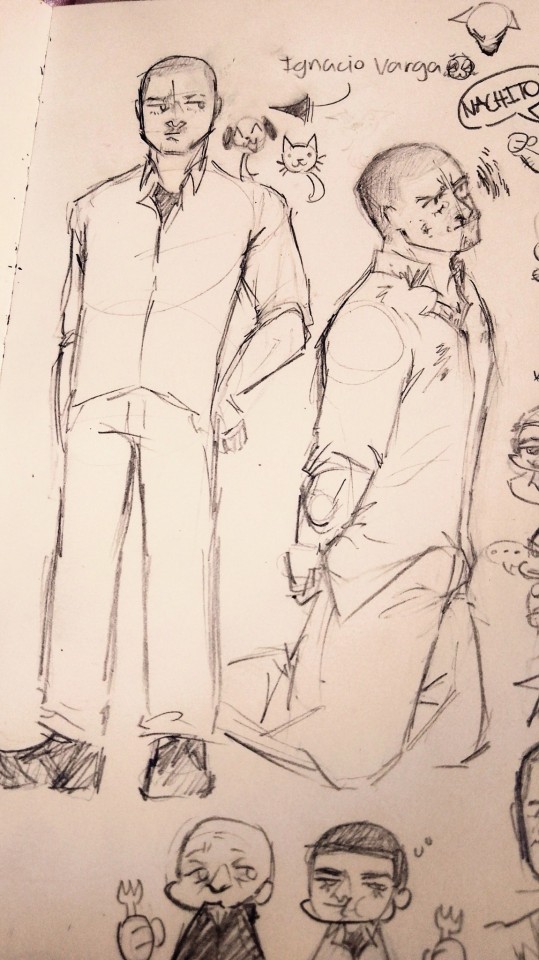
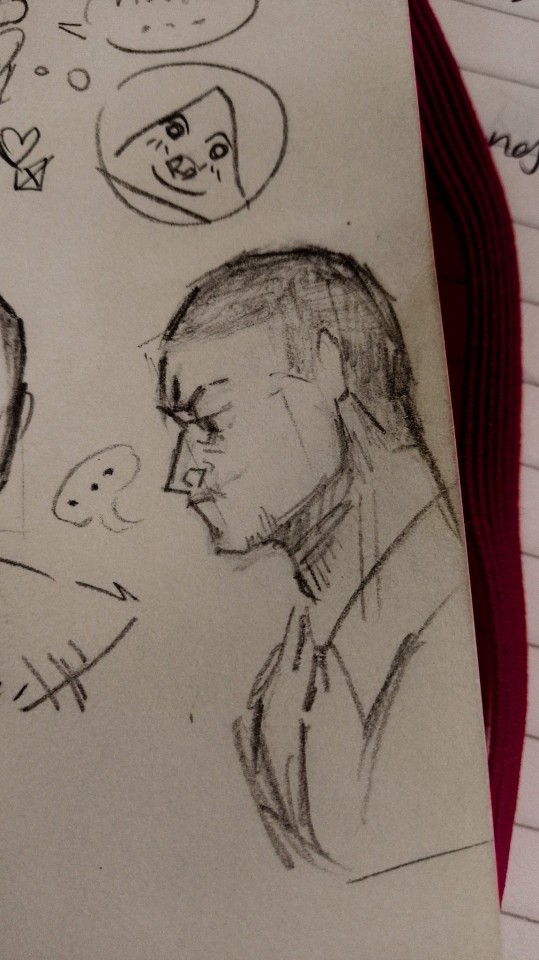
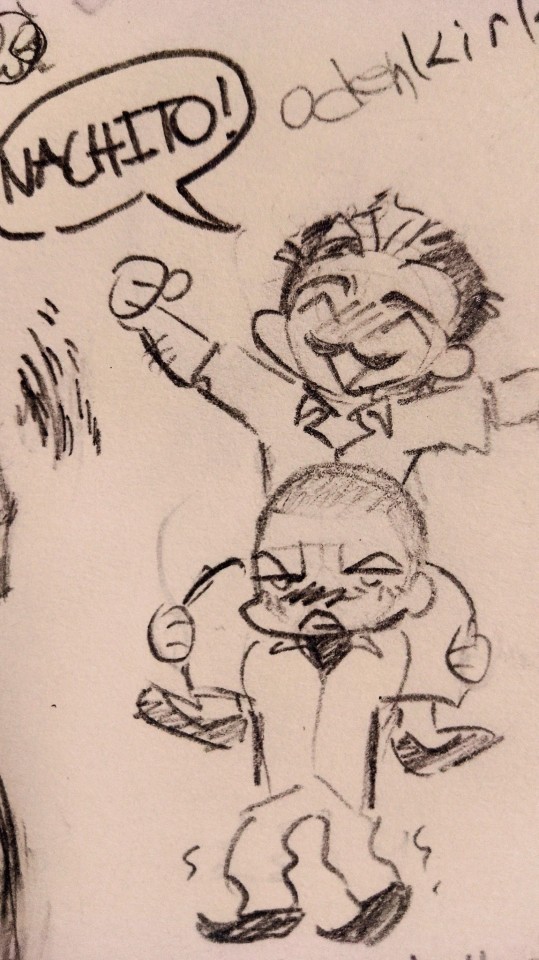
74 notes
·
View notes









